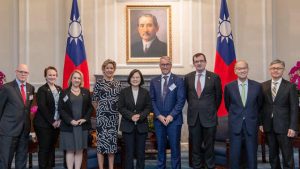Home » Commentary » Opinion » Another rebuke to Beijing
· Ideas@TheCentre
 Last weekend, Taiwan’s first female leader was re-elected in a landslide to claim a new four-year mandate. Tsai Ing-wen – a 63-year-old admirer of Margaret Thatcher and former law academic — defeated the Opposition Nationalist leader Han Kuo-yu in the best result for any presidential candidate since Taiwan began holding democratic elections in 1996. The DPP also maintained its legislative majority.
Last weekend, Taiwan’s first female leader was re-elected in a landslide to claim a new four-year mandate. Tsai Ing-wen – a 63-year-old admirer of Margaret Thatcher and former law academic — defeated the Opposition Nationalist leader Han Kuo-yu in the best result for any presidential candidate since Taiwan began holding democratic elections in 1996. The DPP also maintained its legislative majority.
Taiwan’s resilient economy contributed to the victory, but Tsai’s dramatic political comeback is widely seen as a rebuke to Beijing’s attempts to impose its will and influence on this robust island democracy of 24 million people.
The emphatic DPP victory represents another setback for Beijing. It is of particular relevance to Australia. In recent months, several Sinophiles have argued that our nation indulges in anti-China hysteria. Concerns about Beijing’s interference in our politics and universities amount to some kind of panic. Security hawks exaggerate the ‘red’ threat. Canberra, we are told, is out of step with a region that is accommodating the rise of a superpower.
However, anxieties about China are hardly confined to Australia. And Taiwan’s election result is just one of many examples of growing regional concerns about a rising China.
Hong Kong’s anti-China protests culminated in the landslide victory of pro-democracy candidates in district council races in November. Indonesia, Malaysia, Vietnam and The Philippines continue to challenge Beijing’s territorial claims in the South China Sea. India and Japan engage with Washington to check China’s power.
Some foreign-policy scholars say time is on China’s side and that Taiwan — which Beijing sees as a mere renegade province — is in deep trouble if China continues to grow at an impressive rate. Perhaps.
But that outcome is a long time off and who knows what can happen between now and then. China has very real weaknesses and limitations, the US remains deeply engaged in Asia, and Taiwan, like Hong Kong, has the weight of international opinion firmly on its side.
So it makes sense for the US, Australia and like-minded allies to maintain close relations with Taiwan, but to make sure Taipei does not provoke China into attacking it.
Ever since Richard Nixon and Gough Whitlam visited China in the early 1970s, both Washington and Canberra have adhered to a One China policy, in which we acknowledge the Chinese view that there is but one China, and that Taiwan is part of China.
Our interests on this issue are best served by maintaining a status quo that balances de facto autonomy with formal ambiguity of status for Taiwan. Anything that tilts that balance – in either direction – could make us prisoner of events.
Tom Switzer was part of the American Enterprise Institute delegation to the Taiwan elections. This is an edited extract of an opinion piece published in the Australian Financial Review as Taiwan votes for sovereignty and against Beijing’s autocracy
Another rebuke to Beijing